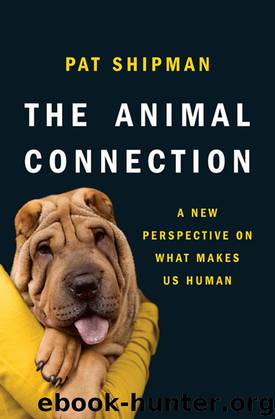The Animal Connection: A New Perspective on What Makes Us Human by Pat Shipman

Author:Pat Shipman [Shipman, Pat]
Language: eng
Format: mobi
Publisher: W. W. Norton & Company
Published: 2011-06-13T04:00:00+00:00
Though the breakthrough in part may have been due to Helen’s ability to speak prior to her illness, the recounting is deliberately dramatic. But there can be no doubt that the origin of language contained many such moments when two individuals found themselves suddenly able to share information. Naming, for Helen, was the first step in having power over her world and being able to control herself and her life, as it is for many hearing children.
A closely parallel realization occurred to Genie, the abused child who was isolated from human communication until age thirteen. As recorded in books, articles, and videotapes, as soon as Genie realized that there were names for things in the world and that she was permitted to voice them without punishment, she became hungry to learn the names of as many things as she could. Her joy in learning the words and experiences of which she had been deprived for so long seems like an intellectual explosion.
Neither Genie’s experiences nor Helen’s tell us how humans first invented or evolved language. What they show us is how immensely powerful the ability to encode and transmit information is to modern humans.
In our evolutionary history, it seems inevitable that the ability to communicate more and more effectively spread rapidly after such breakthroughs. And this new and powerful ability—language—altered the life of those who possessed it. As Chomsky argues, language is used in part for ordering and developing thoughts.
Language also has important social and economic functions for working and living in groups. True, language is not necessary in order to work cooperatively with another individual. Lions lack language (as far as we know) and yet hunt cooperatively all the time; many species share tasks like babysitting or standing guard while the rest of the group forages without any explicit linguistic agreements that humans can detect. Many primates also lead complex social lives and keep close track of shifting alliances and the ever-changing positions of the members of a social group, without language. Though communication is clearly possible and extensive without language, planning, bonding a group into an effective social unit, and complex cooperation are surely facilitated by language.
Creating a division of labor and developing specializations would also be enhanced by language. For example, a better hunter might trade meat in exchange for better stone tools that were skillfully knapped by another; artists recording valuable information about the habits of game animals in paintings and carvings might be able to add information based on others’ knowledge or experience. Language meant it was no longer necessary to rely only on what you yourself saw or heard; my information could be supplemented with your experiences, opening up a revolutionary new panorama of opportunities.
Language triggered the birth of a new world—for humans and for the animals around them—because language allowed humans to talk about animals and in time, with animals.
Download
This site does not store any files on its server. We only index and link to content provided by other sites. Please contact the content providers to delete copyright contents if any and email us, we'll remove relevant links or contents immediately.
| Anthropology | Archaeology |
| Philosophy | Politics & Government |
| Social Sciences | Sociology |
| Women's Studies |
Born to Run: by Christopher McDougall(7127)
The Leavers by Lisa Ko(6948)
iGen by Jean M. Twenge(5416)
Sapiens by Yuval Noah Harari(5372)
Spare by Prince Harry The Duke of Sussex(5197)
The Kite Runner by Khaled Hosseini(5180)
Machine Learning at Scale with H2O by Gregory Keys | David Whiting(4313)
Bullshit Jobs by David Graeber(4192)
Never by Ken Follett(3957)
Goodbye Paradise(3810)
Livewired by David Eagleman(3775)
Fairy Tale by Stephen King(3399)
A Dictionary of Sociology by Unknown(3085)
Harry Potter 4 - Harry Potter and The Goblet of Fire by J.K.Rowling(3074)
The Social Psychology of Inequality by Unknown(3031)
The Club by A.L. Brooks(2926)
Will by Will Smith(2920)
0041152001443424520 .pdf by Unknown(2846)
People of the Earth: An Introduction to World Prehistory by Dr. Brian Fagan & Nadia Durrani(2739)
